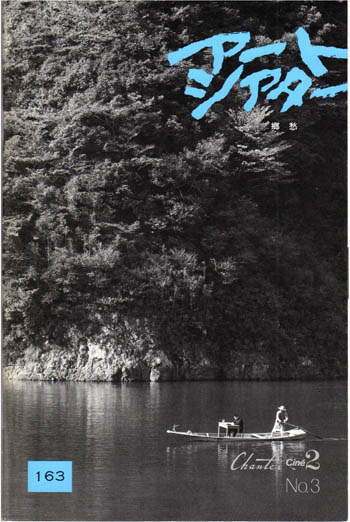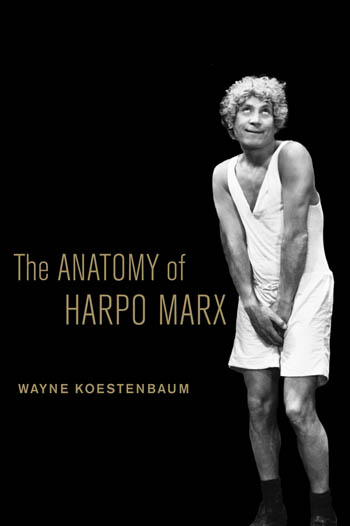The Cannes Film Festival pretty much sucked all the air out of the room last week, so there’s quite a bit of reading (and news) to catch up with. But first, Nihon Cine Art has added two more titles to its collection of Art Theatre Guild pamphlets, Lost Lovers (Kunio Shimizu and Sôichirô Tahara, 1971) and Remembrance (Takehiro Nakajima, 1988). These ATG pamphlets are great fun to flip through even if (like me) you can’t read Japanese.
The New Yorker greets summer with a Science Fiction Issue, featuring Colson Whitehead‘s “A Psychotronic Childhood,” a reminiscence of growing up in the ’70s: “Other kids played in Central Park, participated in athletics, basked and what have you in the great outdoors. I preferred to lie on the living-room carpet, watching horror movies.” The issue also features a short story by William Gibson and Laura Miller‘s survey of the first aliens to be depicted in literature.
The New Yorker‘s also relaunched its books blog as Page-Turner and last week Richard Brody revisited “an old (albeit virtual) quarrel I had” with Susan Sontag: “I am for interpretation. The very title of Sontag’s famous essay ‘Against Interpretation,’ which also became the title of her first collection of essays, is inimical to a useful way of watching movies, whether Hitchcock’s or Godard‘s.” He followed up with a consideration of Sontag’s list of “Best films (not in order),” 228 in all, of which Brody lists 50.
“Ernst Lubitsch once dubbed Erich von Stroheim the cinema’s only novelist, succinctly defending his fellow director’s ruinous passion for detail and duration,” writes Imogen Smith for Alt Screen. “Stroheim wanted to push past the dramatic boundaries of feature filmmaking, but not by piling on more plot; his films are epic in their intimacy.” Smith’s piece is itself rather epic and the occasion is Film Forum’s Von Stroheim series, running Mondays through July 30. Smith’s also a regular contributor to the Chiseler, currently featuring Dan Callahan on Colin Clive and David Cairns on Chester Morris.
Alexei the Great: The Films of Alexei Gherman, Russian Master is on at the Pacific Cinémathèque in Vancouver through June 25 and History Through the Wrong End of the Telescope: The Films of Aleksei Guerman runs at the Harvard Film Archive from June 22 through 25. At Moving Image Source, Michael Atkinson surveys the work of this “recalcitrant St. Petersburg badass who has so far made only five movies in a 44-year career that traded enraged spittle with every manner of Soviet and post-Soviet authority entity.”
Jason Sperb has not only co-edited both volumes of Cinephilia in the Age of Digital Reproduction, he’s got a book coming out in December, Disney’s Most Notorious Film: Race, Convergence and the Hidden Histories of Song of the South—and he’s working on another, Haunted Nerves, “which will focus on the key role of nostalgia in so many of today’s blockbuster transmedia franchises—namely, Prometheus (Alien), Transformers, Tron, GI Joe, Star Trek, Terminator and so forth.” He elaborates.
“It was 1968, and former silent film star Ramon Novarro had downsized from his Frank Lloyd Wright-designed mansion to a one-story Spanish-style ranch house. The movie roles had long dried up, and he was reduced to the occasional guest spot in TV shows like Bonanza and The Wild Wild West. But the 69-year-old Novarro would soon be front-page fodder again.” For Out, William van Meter revisits a murder and “one of the biggest scandals Hollywood has ever seen.” Via Steve Greene at Criticwire.
“In 1976 Werner Herzog hypnotized his cast of actors and directed one of the strangest narrative films in the history of cinema, Heart of Glass,” writes David Licata for Filmmaker. “Alan Greenberg, then a young writer, aspiring filmmaker, and Herzog disciple, was on the set, and thirty-odd years later he, and Herzog, would like to tell you all about it. Hence, Every Night the Trees Disappear: Werner Herzog and the Making of Heart of Glass.” And at the Film Society of Lincoln Center, Violet Lucca has a brief entry on Hearsay of the Soul, Herzog’s video installation in the Whitney Biennial.
“Harpo is, for me, the One. Not even the trinity—the One. That’s what biographers, or anyone in love, must feel—a lunatic absorption in this other person, this One, who contains everything. The Harpo project did not begin with love; as with all obsessions, only repeated visitations allow a subject or object to accrue aura.” That’s Wayne Koestenbaum in The Anatomy of Harpo Marx; for more, head to DC’s.
John Anderson in the New York Times: “Asked why so many women go into editing, Mary Jo Markey, who regularly works for J.J. Abrams, put it plainly: ‘A lot of women go into editing because women go into editing.'”
In other news. The Toronto International Film Festival will open a David Cronenberg exhibition, featuring a film series and an augmented reality game, in the fall of 2013 and then take it on tour beginning in the summer of 2014. Twitch‘s Todd Brown has the press release.
In the works. Vulture‘s Claude Brodesser-Akner caught our attention twice last week, reporting first that Zach Galifianakis might play Ignatius J. Reilly in an adaptation of John Kennedy Toole’s A Confederacy of Dunces. Of course, Brodesser-Akner also reminds us that various filmmakers have been trying and failing to set up projects based on the Pulitzer Prize-winning novel for three decades now. Two days later, Brodesser-Akner reported that Sean Durkin (Martha Marcy May Marlene) is planning to turn William Peter Blatty’s The Exorcist into a ten-episode television series.
“Natalie Portman is attached to star in and produce Jane Got a Gun, a Western written by Brian Duffield that popped up on the Black List of top screenplays. Lynne Ramsay is attached to direct, The Hollywood Reporter has learned.”
Variety reports that Wes Anderson and Noah Baumbach will produce Peter Bogdanovich’s “quirky indie comedy” Squirrels to the Nuts. Brie Larson, Owen Wilson, Jason Schwartzman and Olivia Wilde are attached. On a somewhat related note, the Playlist‘s Simon Dang gathers speculation as to what Roman Coppola might get up to once he completes A Glimpse Inside the Mind of Charles Swan III. A project with Jason Schwartzman is one of two he seems to be considering.
The New Yorker‘s Richard Brody relates the probable back story of the film Claude Lanzmann is currently working on about Theresienstadt, Last of the Unjust.
At Artinfo, Graham Fuller spots a “Near-Trend: Sexy 19th-Century French Novels on Film.” And he cites three projects: Mathieu Amalric’s writing an adaptation of Stendhal’s The Red and the Black; Sophie Barthes has lined up Mia Wasikowska, Paul Giamatti and Ezra Miller for her take on Flaubert’s Madame Bovary; and Charlie Stratton is currently shooting Zola’s Thérèse Raquin with Elizabeth Olsen, Tom Felton and Jessica Lange.
The John Sayles Blog has a few details on the director’s 18th feature, Go for Sisters: “With a budget well under a million dollars and four weeks to shoot, this will be a return to the guerilla style of filmmaking familiar to Sayles from his early 80’s films Return of the Secaucus Seven, Lianna and Brother from Another Planet. Production will begin in mid-July.”
Rupert Everett is planning to direct himself, Colin Firth, Emily Watson, Tom Wilkinson and Edward Fox in a biopic based on the last days of Oscar Wilde, reports the BBC.
For news and tips throughout the day every day, follow @KeyframeDaily on Twitter and/or the RSS feed. Get Keyframe Daily in your inbox by signing in at fandor.com/daily.





